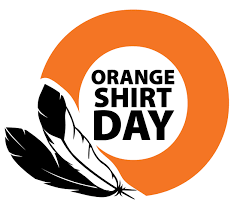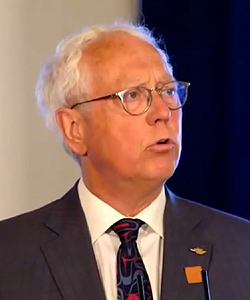Friday September 30, 2022 | NATIONAL
by Mary P Brooke | Island Social Trends
This is already the second annual Orange Shirt Day. Canadians seem to be working intently with the meaning and expectations of this day.
It was only last year that the fuller awareness of how Indigenous peoples had been treated for over 100 years in Canada, has emerged for the broader range of Canadians. That awareness was kicked into full gear by the discovery of unmarked graves on the sites of several former Indian Residential Schools.
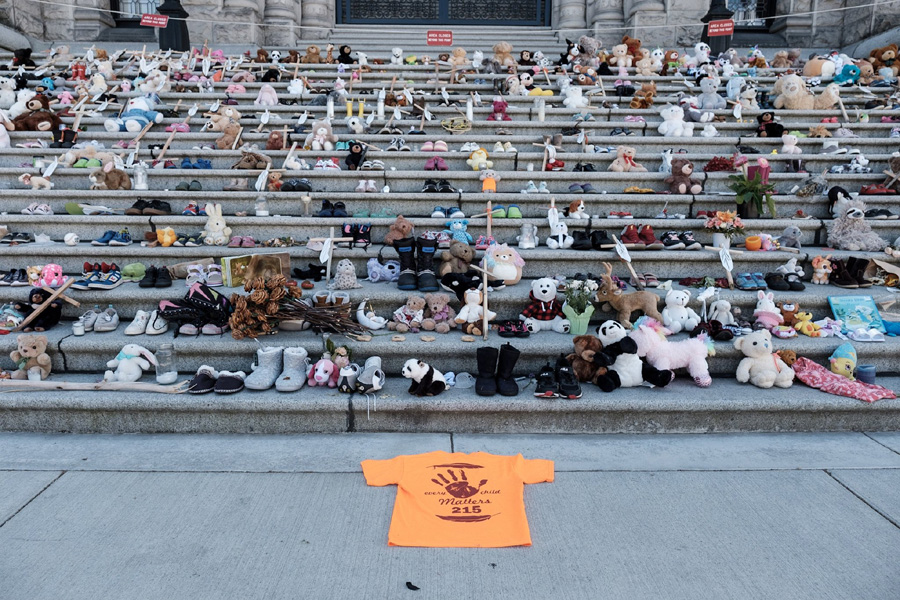
Today on September 30, 2022 Premier John Horgan and Murray Rankin, Minister of Indigenous Relations and Reconciliation issued a statement on Orange Shirt Day and the National Day for Truth and Reconciliation
Federal NDP leader Jagmeet Singh says this day of reflection wouldn’t have been possible without the advocacy of First Nations, Inuit and Metis Leaders, and commends their commitment.
Today Prime Minister Justin Trudeau said: “It is our shared responsibility to confront the legacy of residential schools.”
Statements in full:
Premier John Horgan and Murray Rankin, Minister of Indigenous Relations and Reconciliation issued a statement on Orange Shirt Day and the National Day for Truth and Reconciliation
“Sept. 30 is a significant day in B.C. and throughout Canada to honour the resilience, strength and healing journeys of residential school survivors and intergenerational survivors.
“We remember the children who never came home. The continued findings at former Indian Residential Schools have sparked moments of profound and sombre reflection. We stand in solidarity with First Nations as they find answers for the generations of families who were forcibly taken to, and profoundly affected by, these institutions.
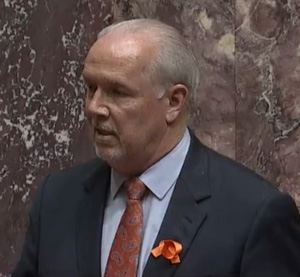
“We recognize this as the beginning of a long journey. We will continue to support those communities that have taken on the deeply painful work of finding their missing children.
“For many survivors, September brings back sad memories of being taken away from their families and communities. Widely known as Orange Shirt Day, Sept. 30 was founded by Phyllis Webstad based on her experiences at St. Joseph Mission Residential School near Williams Lake.
“What began as a grassroots campaign has become a national movement calling for deep reflection on our shared history and a recognition that we are all responsible for advancing reconciliation, anti-racism and anti-bullying.
“This day reminds us of our obligation to deepen our understanding of Canada’s colonial history and address the systemic inequities that First Nations, Métis and Inuit people continue to experience. We must acknowledge a dark history, while always learning from and listening to the survivors of Indian Residential Schools, Indian Day Schools, Indian Hospitals and the Sixties Scoop.
“Throughout the country, today is also recognized as the National Day for Truth and Reconciliation. In June 2021, the federal government designated Sept. 30 as a federal statutory holiday in response to Call to Action No. 80 from the Truth and Reconciliation Commission of Canada.
“We encourage all British Columbians to approach today with humility, respect and understanding. Find time to read, watch or listen to Indigenous-created content, participate in a local or virtual event, and wear orange to show that every child matters.
“Today is an opportunity for individuals, families, communities, schools, workplaces and faith communities to come together and begin new conversations on reconciliation. By working together, we can strengthen relationships between Indigenous and non-Indigenous people today and for generations to come.”
Support services are available:
- A National Indian Residential School Crisis Line has been set up to provide support for former residential school students and those affected. Access emotional and crisis referral services by calling the 24-hour national crisis line: 1 866 925-4419.
- From anywhere in B.C., the KUU-US Crisis Line Society provides a First Nations and Indigenous-specific crisis line available 24 hours a day, seven days a week, toll-free. The KUU-US Crisis Line can be reached at: 1 800 588-8717.
- Alternatively, call direct into the youth line at: 250 723-2040, or the adult line at: 250 723-4050, or online: https://www.kuu-uscrisisline.com/
Jagmeet Singh, the Leader of Canada’s NDP:
“Today, Canadians across the country honour the children who never returned home, Survivors of residential schools, their families and communities. We also reflect on our collective history of colonialism and genocide and how it continues to impact Survivors, families and communities today. As unmarked graves continue to be uncovered, today is a reminder of the harm caused and the work to be done.
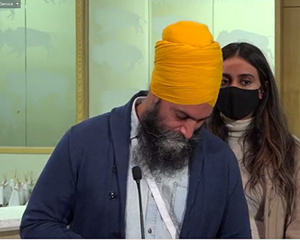
This day of reflection would not have been possible without the advocacy of First Nations, Inuit and Metis Leaders, and we commend their commitment to fighting for a better future for all Indigenous people. Governments at every level need to take concrete steps toward reconciliation by listening, learning, and working with Indigenous leaders and communities to advance justice for Indigenous people.
Despite tireless advocacy, the federal government is still denying Indigenous communities much of the funding they have requested for discovering the remains at former residential schools and healing programs. Across the country, there are still 32 long-term boil water advisories in effect in 28 communities, and at least 45 short-term drinking waters advisories in Indigenous communities. More troubling, as Indigenous women and girls face an ongoing genocide, the government has failed to build new shelters to help Indigenous women and gender-diverse people and children flee violence.
New Democrats know more action is needed to advance reconciliation. We will continue to work to harmonize Canada’s laws with UNDRIP and to implement all Calls to Action and Calls for Justice. We are committed to helping survivors heal, lifting all boil water advisories, and ensuring Indigenous women, girls and gender-diverse people can thrive in safe environments. Today, on the National Day for Truth and Reconciliation, New Democrats reaffirm our commitment to advance reconciliation in true and equal partnership with First Nations, Inuit and Métis people.”
Prime Minister Justin Trudeau on this 2nd Orange Shirt Day:
The Prime Minister, Justin Trudeau, today issued the following statement on the National Day for Truth and Reconciliation:
“Today, we mark the second National Day for Truth and Reconciliation – an opportunity to come together to reflect on the legacy of residential schools and the ongoing impacts on Survivors, their families and communities, as well as commit to continuing the hard, but necessary work to build a better future for all.
“Between 1831 and 1998, at least 150,000 First Nations, Inuit, and Métis children were forcibly removed from their families and communities to attend residential schools, where they had to abandon their languages, cultures, spiritualities, traditions, and identities. Many experienced physical, emotional, and sexual abuse, and thousands never came home. The experiences and intergenerational trauma of these so-called schools continue to live on for Indigenous Peoples across the country every single day.
“It is our shared responsibility to confront the legacy of residential schools and the ongoing impacts on Indigenous Peoples, so we can truly move forward together. That is why, last year, Parliament voted unanimously to establish the National Day for Truth and Reconciliation as an opportunity for all Canadians to learn more, honour the Survivors of residential schools, their families, and their communities, and remember the many children who never returned home. Reconciliation is not the responsibility of Indigenous Peoples – it is the responsibility of all Canadians. It is our responsibility to continue to listen and to learn.
“This past July, His Holiness Pope Francis offered an apology to Survivors, their families, and their communities here in Canada, and recognized the abuses experienced at residential schools that resulted in cultural destruction, loss of life, and ongoing trauma for Indigenous Peoples across the country. It was a step forward in all the work that remains and a reminder that we still have more to do. We will continue to be there to support the painful but necessary work to locate unmarked graves, and to support Survivors as they tell their stories, including through the efforts of the Independent Special Interlocutor for Missing Children and Unmarked Graves and Burial Sites, Kimberly Murray, who was appointed this past June. We are also ensuring the appropriate supports are available for communities to heal and commemorate the lives that were lost.
“Last month, alongside the National Centre for Truth and Reconciliation leadership, Survivors, and members of Indigenous communities, I witnessed the Survivors’ Flag raising on Parliament Hill to honour Survivors and all the lives that have been or continue to be impacted by the residential school system. The flag serves as a reminder of the government’s commitment to Survivors and future generations to never forget what happened at these so-called schools. Over the last year, we updated Canada’s Oath of Citizenship to recognize First Nations, Inuit, and Métis rights, and introduced legislation to establish a National Council for Reconciliation to track and report on the implementation of the Truth and Reconciliation Commission’s Calls to Action. Through the United Nations Declaration on the Rights of Indigenous Peoples Act, we continue to work with Indigenous Peoples to ensure their human rights are fully recognized, respected, and protected.
“On this day, which is also known as Orange Shirt Day, I invite everyone to listen to Survivors and learn more about the history and legacy of the residential school system by participating in a local event or wearing an orange shirt. Let’s take a moment today to participate, learn, and reflect. We all have a role to play on the journey toward reconciliation.”
===== ABOUT ISLAND SOCIAL TRENDS
Island Social Trends covers the news through a socioeconomic lens.
In 2008, editor Mary P Brooke launched the series of publications (MapleLine Magazine, Sooke Voice News, then West Shore Voice News) that emerged in mid-2020 as the fully online news portal Island Social Trends.
Subscribers enjoy a curated ENews digest of all articles posted within the Island Social Trends portal. | Island Social Trends – free ENews signup
===== ABOUT THE WRITER:
Mary P Brooke, B.Sc, Cert PR, is the founder, publisher and editor of Island Social Trends (and the series preceding: MapleLine Magazine 2008-2010, Sooke Voice News 2011-2013, West Shore Voice News 2014-2020).
Her mission statement statement for these publications is to create a news following that examines the various impacts that make up our social, economic and political realities.
The digest style supports a knowledge-based society and economy.


